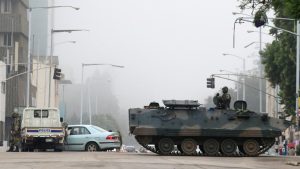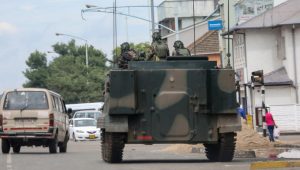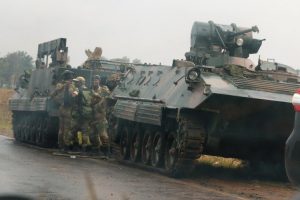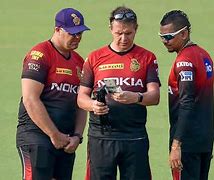Feature
Army takes over Zimbabwe, President Robert Mugabe puts under house arrest
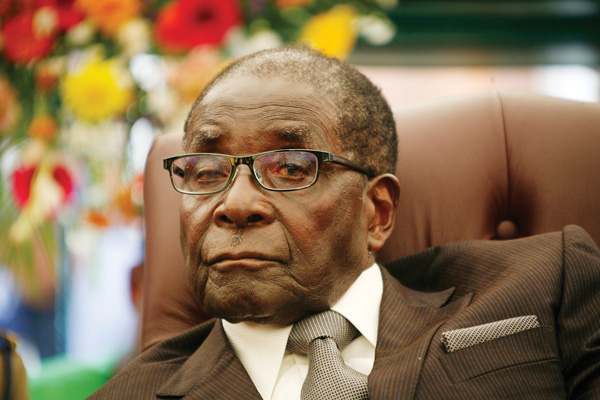
Harare: President Robert Mugabe, who has ruled Zimbabwe for nearly four decades, was under house arrest on Wednesday, hours after the military announced it had taken him into custody in what appeared to be a coup.
The fate of Mugabe, 93, who kept a tight grip on his southern African nation despite his increasing diplomatic isolation from the West, appeared to be in the hands of former allies and opposition officials negotiating his future.
South African President Jacob Zuma said he had spoken to Mugabe who had indicated that he “was confined to his home but that he was fine”. Troops were reportedly stationed at the country’s Parliament and Presidential Palace, international online web media reported.
In a dramatic televised statement early on Wednesday, an Army spokesman denied that a military takeover was underway.
But the situation bore all the hallmarks of a coup. The Army was in control of the state broadcaster Zimbabwe Broadcasting Corp (ZBC), there was a significant military presence at the international airport and Mugabe’s whereabouts were unknown for hours.
After taking over ZBC, two uniformed officers said in a terse pre-dawn announcement that “the situation in our country has moved to another level”.
While denying that the military had seized power, they said Mugabe and his family “are safe and sound and their security is guaranteed”, international English news channel reported.
“We are only targeting criminals around him (Mugabe) who are committing crimes that are causing social and economic suffering in the country in order to bring them to justice,” said Major General S.B. Moyo, the Army’s Chief of Staff.
He warned that “any provocation will be met with an appropriate response”.
The early morning broadcast interruption came less than 48 hours after Army commander Constantino Chiwenga warned that “when it comes to matters of protecting our revolution, the military will not hesitate to step in”.
In response, Mugabe’s ruling party Zanu-PF accused Chiwenga of “treasonable conduct”.
Zimbabwe under control of Military, President Robert Mugabe kept in house arrest:
Witnesses reported tanks and soldiers moving around the city overnight along with sounds of gunfire and explosions. By morning, soldiers in armoured vehicles controlled major intersections near government buildings. But otherwise the streets appeared to be calm. Shops and banks were open and most people carried on business as usual.
Some people praised the military while many said they feared speaking amid the uncertainty.
Street vendor Tendai Muganhu, 43, said, “I am happy because I know whoever will come into power won’t be like Mugabe, won’t chase vendors from streets, but will certainly improve our lives.”
The military did not say whether Mugabe, who has ruled Zimbabwe since 1980, had been removed as President.
Local media reported that several members of the Zanu-PF party had been detained by the military, including cabinet ministers.
The intervention came after weeks of political turmoil, in which Mugabe sacked his powerful Vice President Emmerson Mnangagwa, who enjoyed wide support in the military and was tipped to become the next leader.
The move fuelled speculation Mugabe would try to install his wife, Grace, to succeed him.
Mnangagwa was reported to be on his way back to Zimbabwe and now is seen as the country’s new leader. Negotiations were underway between Mnangagwa’s allies and opposition parties to possibly form an interim government that would soften international criticism of the military takeover.
No resistance could be seen from forces that had long remained loyal to the President, including the presidential guard and the vast network of secret intelligence that had helped Mugabe keep a grip on the nation despite a crumbling economy and diplomatic isolation.
Mnangagwa was also known to be on good terms with Morgan Tsvangirai, the longtime leader of the main opposition party, the Movement for Democratic Change.
Chris Mutsvangwa, an aide to Mnangagwa, said that in a possible interim government, Mnangagwa would serve as President and Tsvangirai as Prime Minister.
Entertainment
Meghalaya Reserves Legalized Gambling and Sports Betting for Tourists

The State Scores Extra High on Gaming-Friendly Industry Index
Meghalaya scored 92.85 out of 100 possible points in a Gaming Industry Index and proved to be India’s most gaming-friendly state following its recent profound legislation changes over the field allowing land-based and online gaming, including games of chance, under a licensing regime.
The index by the UK India Business Council (UKIBC) uses a scale of 0 to 100 to measure the level of legalisation on gambling and betting achieved by a state based on the scores over a set of seven different games – lottery, horse racing, betting on sports, poker, rummy, casino and fantasy sports
Starting from February last year, Meghalaya became the third state in India’s northeast to legalise gambling and betting after Sikkim and Nagaland. After consultations with the UKIBC, the state proceeded with the adoption of the Meghalaya Regulation of Gaming Act, 2021 and the nullification of the Meghalaya Prevention of Gambling Act, 1970. Subsequently in December, the Meghalaya Regulation of Gaming Rules, 2021 were notified and came into force.
All for the Tourists
The move to legalise and license various forms of offline and online betting and gambling in Meghalaya is aimed at boosting tourism and creating jobs, and altogether raising taxation revenues for the northeastern state. At the same time, the opportunities to bet and gamble legally will be reserved only for tourists and visitors.
“We came out with a Gaming Act and subsequently framed the Regulation of Gaming Rules, 2021. The government will accordingly issue licenses to operate games of skill and chance, both online and offline,” said James P. K. Sangma, Meghalaya State Law and Taxation Minister speaking in the capital city of Shillong. “But the legalized gambling and gaming will only be for tourists and not residents of Meghalaya,” he continued.
To be allowed to play, tourists and people visiting the state for work or business purposes will have to prove their non-resident status by presenting appropriate documents, in a process similar to a bank KYC (Know Your Customer) procedure.
Meghalaya Reaches Out to a Vast Market
With 140 millions of people in India estimated to bet regularly on sports, and a total of 370 million desi bettors around prominent sporting events, as per data from one of the latest reports by Esse N Videri, Meghalaya is set to reach out and take a piece of a vast market.
Estimates on the financial value of India’s sports betting market, combined across all types of offline channels and online sports and cricket predictions and betting platforms, speak about amounts between $130 and $150 billion (roughly between ₹9.7 and ₹11.5 lakh crore).
Andhra Pradesh, Telangana and Delhi are shown to deliver the highest number of bettors and Meghalaya can count on substantial tourists flow from their betting circles. The sports betting communities of Karnataka, Maharashtra, Uttar Pradesh and Haryana are also not to be underestimated.
Among the sports, cricket is most popular, registering 68 percent of the total bet count analyzed by Esse N Videri. Football takes second position with 11 percent of the bets, followed by betting on FIFA at 7 percent and on eCricket at 5 percent. The last position in the Top 5 of popular sports for betting in India is taken by tennis with 3 percent of the bet count.
Local Citizens will Still have Their Teer Betting
Meghalaya residents will still be permitted to participate in teer betting over arrow-shooting results. Teer is a traditional method of gambling, somewhat similar to a lottery draw, and held under the rules of the Meghalaya Regulation of the Game of Arrow Shooting and the Sale of Teer Tickets Act, 2018.
Teer includes bettors wagering on the number of arrows that reach the target which is placed about 50 meters away from a team of 20 archers positioned in a semicircle.
The archers shoot volleys of arrows at the target for ten minutes, and players place their bets choosing a number between 0 and 99 trying to guess the last two digits of the number of arrows that successfully pierce the target.
If, for example, the number of hits is 256, anyone who has bet on 56 wins an amount eight times bigger than their wager.



